31 Aug Tu’aro Māohi in Tahiti
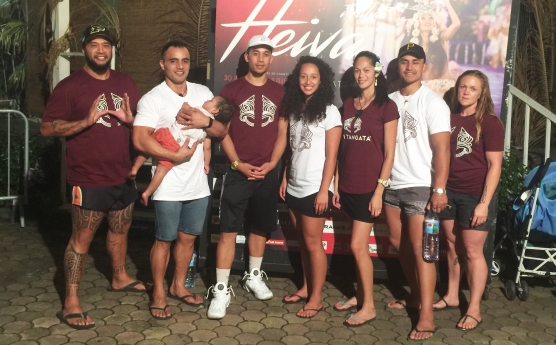
Upon arrival we were embraced by the warmth of the tropical island; a stark contrast to our Aotearoa winter. Although the warmer weather was eagerly anticipated during the training build up, it was also a daunting adjustment to acclimatise within two days before the competition started. Aside from the obvious pre-competition nerves, we were apprehensive about the whole sporting organisation. Tahitians are very relaxed by nature and it seemed as though everyone knew what ought to happen except us. In the days leading up to the event we were able to check out the venue for the maiho a ra’au and were given some rocks to practise with.
The competition started with the maiho a ra’au on day one. Rākau loaded with fruit and vegetation were scattered all around the registration area. Both officials and athletes were hovering around dressed in beautiful bright uniforms and traditional costumes; you could have mistaken the place for a fruit processing station. We were eager to receive our rākau and go through the weigh in process. Although our basic banana ladened rākau and amateur pareo tying techniques would not draw a crowd, we stood out as foreigners.
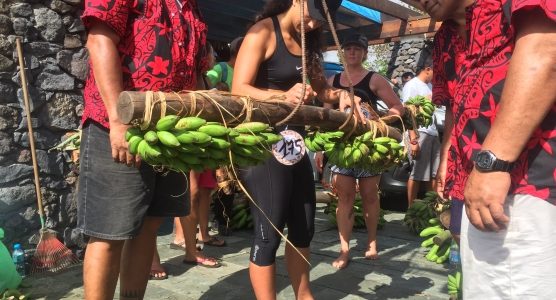
The pre-race brief was overwhelming, especially with the sun beating down, with constantly changing instructions and a French language barrier. The experience was heightened as the crowd was particularly interested in the team of Māori from Aotearoa. Tiffany Te Moni’s beautiful kākahu drew special attention and so a constant flow of cameras and people were glued to us.
After a grounding team karakia the competition kicked off, the buzz grew and the nerves slipped away. At the time I remember reflecting on my training journey and connecting to my pepehā; this moment of clarity was reassuring. In the final stage I felt as though I was where I was supposed to be, then a wave of adrenaline took over and I simply enjoyed the moment.

The next day of competition was electric, there were various activities going on at the same time. The amofai, kurutao, coconut processing and tree climbing all happened at the Museum of Tahiti. For Stephen Te Moni, Taonga Flavell and Marino Flavell, this was a big day. They had trained especially to master the rock lifting techniques for the amofai, and besides the activity they also had to prepare for their weight categories.
Although the museum was a hub of activity, the specific amofai competing area held a different mauri. You could bask in the tapu mauri within the ātea where the same rocks are used every year; to the Tahitians they represent their tīpuna. Before the competition kicked off, all of the competitors were offered a brief on the event, a karakia and a special moment of silence for the Bastille day attacks in Nice. Amidst this moment, one of the team from Aotearoa unexpectedly fainted in the heat. This turned up the adrenalin and everyone acted fast to support, we reconnected with another karakia and the lifting began.
The amofai was an impressive display, the technique required to lift 65, 90 and 104 kilograms in split seconds is unbelievable. I competed in the women’s under 80 kilogram category. I had never successfully lifted a 65 kilogram rock so I was delighted to simply get it up. Some of the other women involved were considerably larger in muscle and packing power. Their ability whip up the rock left the spectators in admiration and applause.
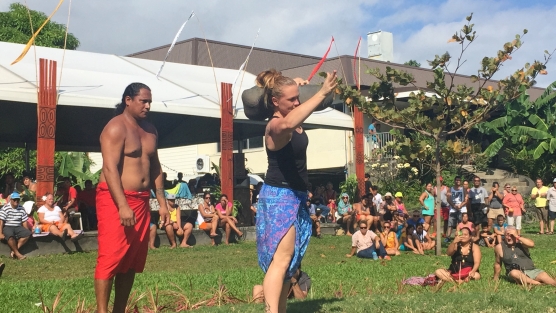
The male competition was more dispersed across weight categories and age groups but the athletic ability demonstrated was incredible. This event showed an impressive synergy of the present and the past. Traditional lifting techniques used by bodies of various shapes and sizes really challenged a contemporary ideal of fitness and performance. In the end, each member from Team Aotearoa performed beyond their expectations and again Sarndra Mear proved successful with a third place award in the women’s under 80 kilogram category.
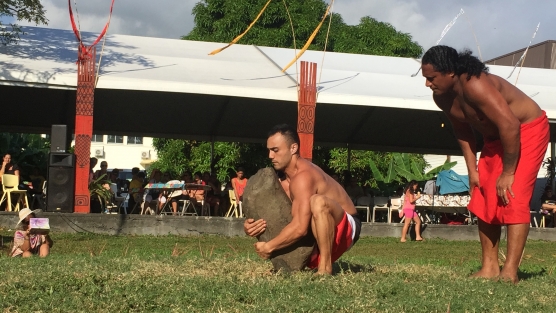
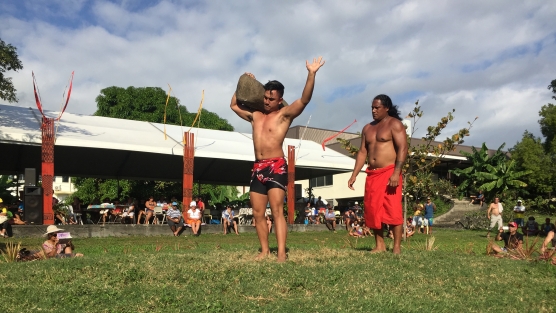
The male competition was more dispersed across weight categories and age groups but the athletic ability demonstrated was incredible. This event showed an impressive synergy of the present and the past. Traditional lifting techniques used by bodies of various shapes and sizes really challenged a contemporary ideal of fitness and performance. In the end, each member from Team Aotearoa performed beyond their expectations and again Sarndra Mear proved successful with a third place award in the women’s under 80 kilogram category.
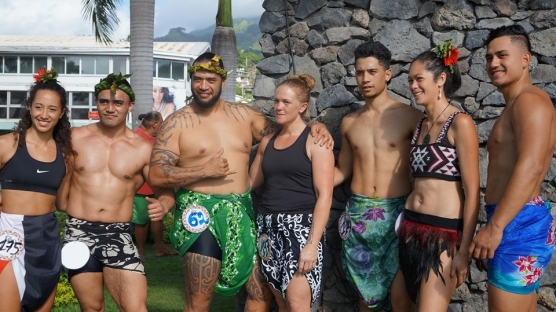
The Māohi from Tahiti have a legion of experience and understanding to share with not only Māori but all Polynesians from the pacific triangle and wider indigenous communities, as they have managed to maintain some of their important cultural practices. Team Aotearoa had two major cultural reflections to take away from the experience in Tahiti. The first was challenging our fixated relationship with details that serve no purpose to indigenous people, such as strict timing schedules and the intent to control the competition environment. The second key reflection that we took away was the boundless manaakitanga they offered us as manuhiri, unconditionally. I look forward to seeing a strengthened relationship between Māori, Pacific and other indigenous cultures through meaningful opportunities like this in the future.
Finally, I would like to take this moment to acknowledge some of the key supporters in making this experience possible. Firstly, much respect and appreciation to Te Papa Tākaro o Te Arawa, namely Paora Te Hurihanganui and Stephen Te Moni. Your leadership and hard work created an opportunity for Team Aotearoa to engage in this meaningful cultural pursuit, which has navigated a path for others to follow in the future. Special acknowledgements to the board and management at Toi Tangata. This experience offered me the honour and privilege to represent the organisation and to share the journey with our wider sector. I cannot forget the manaakitanga from the haukāinga in Tahiti, especially Noa Teiefitu, Tetuarii (Pino) Teapehu, Vai Nui Moe Haa and their whānau. Also to all of the whānau and friends who supported the journey through sponsorship, encouragement, childcare, surprise kai and hugs when we needed them; no support went unnoticed, I just hope that this insight can express a small inkling of our gratitude.
Tama tū, tama ora
Through physical wellbeing we thrive
Nā Hariata Tai Rakena



